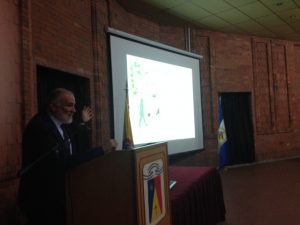Dr Kelvin Momanyi writes about attending the eleventh Tanzania Wildlife Institute (TAWIRI) conference
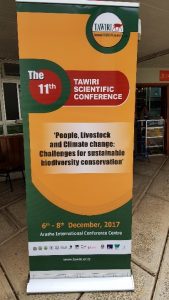
The eleventh Tanzania Wildlife Institute (TAWIRI) conference themed, “People, livestock, and climate change: Challenges for sustainable biodiversity conservation”, was held from 6th to 8th December 2017 at the Arusha International Conference Centre (Fig.1). The conference had over 300 local and global participants with diverse knowledge on wildlife conservation with 4 key note papers, 3 symposia, and 7 parallel sessions amounting to 167 oral and 19 poster presentations whose findings are intended to contribute to wildlife conservation in Tanzania and the region.
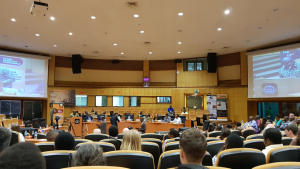
The opening speech by the guest of honour, Deputy Minister-Tanzania Ministry of Natural Resources and Tourism (Fig.2), noted that the ever increasing demand for land is a concern to all of us and puts preservation of natural resources in limbo and that there’s a danger of forgetting the fundamental principle that natural resources are not invulnerable and will be vulnerable indefinitely. In this regard, he urged wildlife scientists to continue providing scientific information to the government, wildlife management authorities, conservation and management partners to help reduce anthropogenic impacts on nature as well as information that will help guide effective development and conservation strategies.
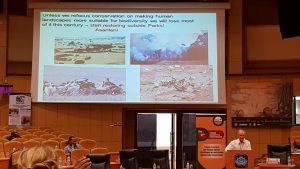
The conference was timely to address the current conservation challenges facing Tanzania characterised by an increasing trend of livestock that interact with wildlife within protected areas. It was reiterated that scientific information has been and should be the backbone of the country’s success story in wildlife conservation. Thus, more scientific information is needed and required on how to improve the livelihood of communities around protected areas by enhancing economic growth by preserving natural resources and mitigating climate change impacts for sustainable conservation of biodiversity.
A key message from the conference presentations, as noted by Prof Sinclair (Fig.3), was that both protected areas and human-based areas are necessary but neither is sufficient for conservation. All ecosystems change continuously and therefore static boundaries will not solve conservation problems since they cannot accommodate change. It was reiterated that what is applicable today would be obsolete in 100 years and therefore important to improve human-dominated landscapes to make them more suitable for biodiversity for the future of protected areas and the stability of human ecosystems.
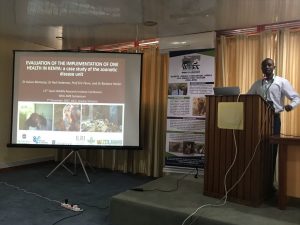
Preliminary results from the NEOH case study, “Evaluation of the implementation of One Health in Kenya: A case study of the Zoonotic Disease Unit”, was presented (Fig.4) in the symposium themed, “Wildlife Diseases and Ecosystem Health” organised by the Wildlife Disease Association, Africa and Middle East section. The presentation noted that the One Health office in Kenya (the Zoonotic Disease Unit) had performed moderately from the evaluation applying the NEOH One Health framework with a One Health Index of 0.73269 and suggesting the following areas to accrue more added values of One Health: (1) integrating One Health into our daily routines; (2) Developing structures and frameworks to institutionalise the concept in Kenya to assure sustainability and government commitment; (3) More community engagement and capacity building though e.g. use of One Health alumni and champions; and (4) Investing in One Health infrastructure as well as catalyse formation of a community of practice.

